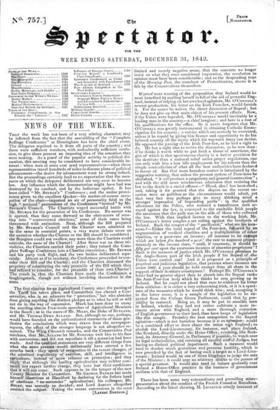If proof were wanting of the proposition that Ireland would
be most benefited by availing herself in full of the aid of powerful Eng- land, instead of relying on her own local agitators, Mr. O'CoNNELL's newest production, his letter on the Irish Poor-law, would furnish it. For the nonce he waives the direct discussion of Repeal ; but
he does not give tip that main object of his present efforts. Now, if the Union were repealed, Mr. O'CoNNE.LL would inevitably be a leading man in the country—a chief lawgiver ; and here is a test of his qualifications for the office. Be it never forgotten that Mr. O'CONNELL was greatly instrumental in obtaining Catholic Eman- cipation for his country ; a service which can scarcely be overrated, unless it be repaid by giving him licence and opportunity to do his beloved country all the injury which his wayward fancy can devise. He opposed the passing of the Irish Poor-law, as he had a right to do. He has a right also to revive the discussion, as he now doea:
if he thinks it worth while to put forth a tissue of assertions, the gist of which is that spontaneous charity is a better provision for
the destitute than a national relief under proper regulations, one can only wish him a less idle employment for his talents than the simple contradiction of what all the best authorities have declared in favour of. But that more harmless matter is introduced by the suggestive warning, that unless the present system of Poor-laws be abolished, " it will produce a sanguinary and general insurrection " ; and with the still more mischievous admission that resisting the law to the death is a venial offence—" Blood, alas ! has been shed ; and, taking it for granted that the slayers on the recent oc- casion were as guiltless as the circumstances would admit, yet that very fact may perhaps give to every thinking mind a stronger impression of impending perils' : in the qualified allowance for the Police, who resisted a tumultuous mob ar- rayed against the law, is conveyed to the excitable Irish people the assurance that the guilt was on the side of those who enforced the law. With that implied licence to the working Irish, Mr. O'ConnEm.'s letter couples a set real; against the landlords of Ireland. Such the temper of the " pacificator," what are his mea- sures ?—Either the total repeal of the Poor-law, followed by an augmentation of medical charities 'and a multiplication of other charities, or a poor-rate on income ; all incomes to be exempt which are below five hundred a year! the rate to augment propor- tionately as the income rises, " until, if necessary, it should be fifty per cent upon the enormous incomes of absentee proprietors" I Such is the measure of justicewhich Mr. MoNNsLL ;itemises to the Anglo-Saxon part of the Irish people if his Repeal of Abe Union were carried ,out! And it is proposed as a principle of practical and judicious legislation, that persons whose incomes are under 5001. a year shouldlie held exempt from all share in the support of their destitute countrymen Perhaps-Mr. O'CoNEELL's letter had no greater object than to absorb into the Repeal ranks the Anti-Poor-law body which he thinks he sees growing up in Ireland. But he could not plead that ruse to withdraw his letter from criticism : it is either a very unbecoming trick, or it is a sped- men of the measures which he would think wise; and, accepting it in the latter sense, it is a sample of the legislation to be ex- pected from the College Green Parliament, could that by pos- 'sibility be restored. Being po, it may be put to sensible men in Ireland, whether they had not rather cultivate a more in- timate union with England, and a more thorough extension of English government to their land, than have heaps of legislation like this sample. Probab!y the best antagonism to the Repeal agitation—which is not harmless because it is an agitation- would be a combined effort to draw closer the union wih England; to abolish the Lord-Lieutenancy, for instance, and place Ireland, like Scotland, directly under the Home Office; retaining, like Scot- land, its Attorney-.General, in Parliament if possible, to watch over its legal technicalities, did retaining all needful staffof Judges, but having no distinct, political department. Such a measure would tend to deaden much gratuitous and. perverse hostility, which is now provoked by the fact of having such a target as a Lord-Lieu- tenant : Ireland would be one of three kingdoms to judge the acts of the Minister ; it could urge no arbitrary dislike to the person of a special governor. It would also tend to induce gradually over Ireland a Home-Office practice in the business of government uniform with that of England.






















